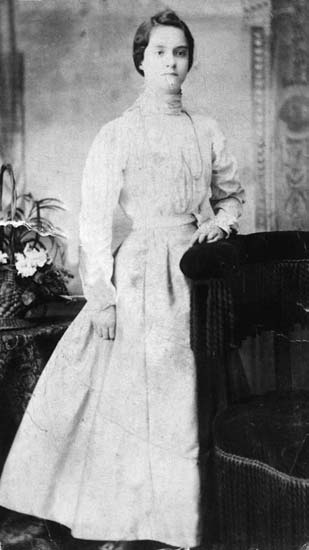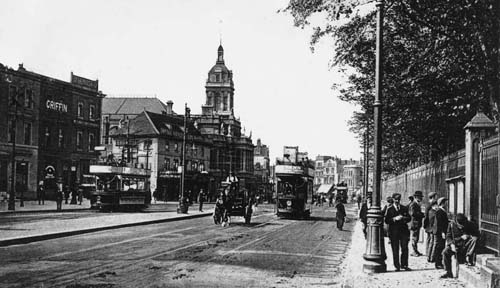Polly
Authors: Jeff Smith


1 Origins and Early Days (1900–12)
2 The First World War (1914–18)
9 A Daughter’s Story (about 1925)
14 Meeting and Marrying Fred (1929–32)
15 The Second World War (1939–45)
17 The Dirtiest Woman in the World (1940–50)
21 Doodlebugs and Rockets (1944–5)

M
ary Rebecca Chambers (my mum, nicknamed Polly), was born on 10 August 1911 in Stratford, east London and was the fourth, but only the second surviving, child of Walter Robert and Mary Dorothy Chambers. They went on to have five more children and they all grew up as a close-knit family in the special community atmosphere which was London’s East End. She lived in that area, mainly Stratford itself, for over fifty years and saw two world wars and the Great Depression from that unique perspective. Polly’s was a life shaped and moulded by those times in an area that was so often at the sharpest of the sharp end of events, be that the grinding poverty of the Depression or the danger and disruption of aerial bombardment.
These events were deeply etched into her memory and she could be reminded of them at any time. For example, one day we saw one of the modern blimps that are now used for advertising and aerial photography. She glanced at it and casually remarked that ‘the first time I saw one of those it was dropping bombs on me!’ Similarly, some fifty or so years after the relevant events, we were sitting in the garden when the RAF Battle of Britain Memorial Flight (a Lancaster bomber accompanied by Spitfire and Hurricane fighters) just happened to pass by at low level behind her. Just the sound made her dissolve into tears, even though she could not see from whence it was coming – the sound itself was just too evocative.
Like so many of her generation, she was denied the chance of any more than the very minimum of a basic education and left school at the earliest possible
legal age to earn a living and contribute to the family purse. Though she rarely spoke about it, she was keenly aware of this lost opportunity and its potential benefits. Perhaps as a result of this she was always the keenest proponent of education, especially for girls – ‘educate a boy and he gets a better job, educate a girl and you educate a whole family’ was one of her favourite sayings. Nevertheless, she was an acute observer of events around her, even if she sometimes had a very idiosyncratic view – she ‘made her own arrangements about things’ as she herself would say. Likewise, her stories are not always consistent, for example, her memory of her mother’s cooking skills seemed to depend more on the needs of the particular story than any cool judgement.
As it happened, Polly was also one of nature’s story tellers. She remembered events, situations and feelings, wove them into a pattern that made sense to her, and delighted to pass the tale on to others whenever she got the chance. Not surprisingly, for many listeners the stories were ‘just ancient history’ and their repetition tedious, but they fascinated me and I am pleased that I realised their value in time to write them down before her death in August 2000. This book is essentially a compilation of her stories, arranged in some sort of chronological order so that they tell the story of her life over those remarkable years. They are told the way she told them, using essentially the words she used, with no attempt to make them historically or factually consistent. Very occasionally I have added my own comment or explanation. Also, in some cases where the subject matter was closely related or sensibly ‘followed on’ I have run a couple of her stories together into a single account. Many of the stories overlapped with each other but no attempt has been made to disentangle them – they are just presented as they were. Ultimately, this was the way she remembered her very ordinary life that was, in fact, quite remarkable in momentous times.
Jeff Smith, 2012
Origins and Early Days
(1900â12)

M
y grandparents came from Hoxton in the East End of London. Grandad had been a farrier, then a carman, and ended up as a piano-remover, which tells you something about how different life was then. For some reason he lost his job and things got tough for a while, but Grandma was a real worker and started to take in washing. Very soon she could afford to have a shed built in the backyard to house some washtubs and she employed some women to come in two days a week to do the washing. There was no heating, but they worked out there in all weathers, even when there was snow on the ground. Mum used to get quite upset and say that Grandma was wicked, but Grandma didn't care. The women she employed didn't care either. For the little bit of extra money they would have come in seven days a week in any weather if they could. Grandma did all the finishing work herself, and she had all the different special irons for doing cuffs, lace, collars, the lot. She worked hard all week, but once finished on a Friday night she would take herself over to the pub and pretty well stay there until Sunday night. Mum said that she even cooked the Sunday lunch from there, telling the kids when to put the joint in the oven, when to turn it over, and in between they would take a bowl of potatoes over to be peeled, then the peas for shelling, and so on.
When Mum and Dad got married they decided to move away from their parents and go off into the country. So they moved to a country cottage down
Mortham Street in Stratford. You can't imagine it now because Stratford is as much part of the East End as Hoxton. To be honest, I couldn't believe it myself when I grew up in the 1920s and â30s because it was already a bit of dirty, industrial, London sprawl and there was no country until past Ilford. Later though, after the Second World War, we lived just around the corner from there, so I went for a walk down to the end of Mortham Street. Sure enough, there was a row of little cottages. By then they were surrounded by London terraces, just like all the rest, but you could see that once they had been in the country â they just had that look about them. So Mum wasn't exaggerating after all.

Mary Dorothy Barker â Mum â pictured in about 1905
.

Stratford Broadway around the time of Polly's birth.
When they got married Dad used to work in the Borough Market but by the time they moved to Mortham Street he was working in Stratford Market so it was quite convenient really, but they decided that it was too quiet out in the country after the hustle and bustle of London. About that time the Carpenters Company decided to develop the land they owned in Stratford and they launched on an ambitious project to build a whole new residential area. I suppose it would be called a New Town these days. That was the start of the Carpenters Road estate and it was the most modern thing you could imagine then â every house had its own water supply and a toilet that you could flush with a chain. They also built a school for the children and public baths â it was out of this world. It was also nearer London, so Mum and Dad moved there and took a house next door to Mum's aunt.
The trouble with Mum's aunt was that she was always borrowing things. Every day she was in for a cup of this or a bowl of that and in the end Mum got fed up with it. So one day she decided to move away. It all seems ever so lax and hit-or-miss these days, but she did not make any plans or arrangements. There was a house empty more or less across the road, so after Dad had gone to work she just set to and moved everything across the road. That afternoon
she had to stand on the doorstep to catch Dad when he came home. Mind you, that house had its disadvantages too. There was a dairy just down the road (can you imagine a dairy in Carpenters Road?) and the fields were a bit further up the other way. So every morning and every evening the cows were brought past Mum's windows, to and from the dairy, to be milked. Then the horses that pulled the milk carts were brought along the same route. She did not put up with that for long and moved back across the road but a bit further up and this was the house where they started their family.
